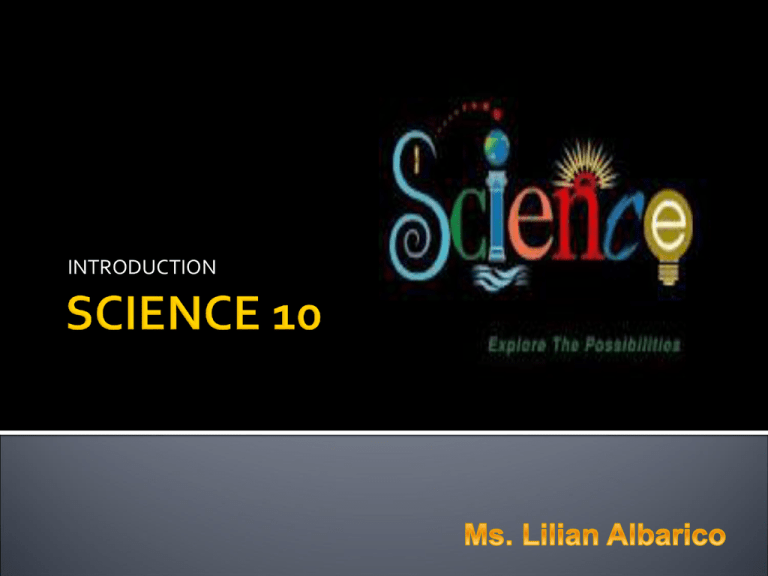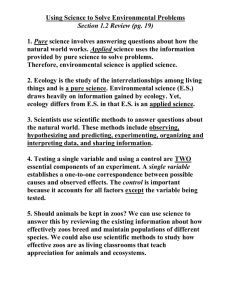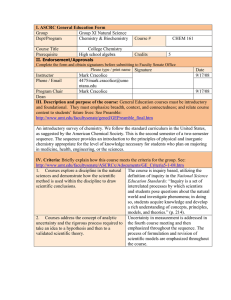welcome to science 10
advertisement

INTRODUCTION OBJECTIVE: - To develop scientific literacy. FOCUS -STSE ( science, technology, society, and environment) 3 Core Studies: 1) Physical Sciences – Chemistry and Physics 2) Life Science - Ecology 3) Earth and Space Science - Meteorology I. Physics (Motion and Energy) a. What Is Motion b. Uniform Motion c. Accelerate Motion d. Life in Motion II. Chemistry (Elements and Compounds) a. Patterns and Compounds b. Investigating Chemical Reactions c. Acids and Bases d. Chemical Reactions and the Environment III. Biology (Ecology) a. Connecting Links b. Cycles of Life c. Change and Sustainability d. Planet Home IV. Earth and Space Science (Weather Dynamics) a. Solar Energy and Weather b. Air, Water, and Solar Energy c. Local Weather Systems d. Humans and Weather Notebook A4 papers Pens/pencils In your own words, define what is a) Science b) Technology Give some examples. Participation Inquiries/ Science Reports Quizzes Chapter/Unit Tests Projects Notes/Journal Midterm Exam Final Exam - 5% 10% 15% 15% 10% 10 % 10% 20% ________________ 100% Science is a way of knowing about nature that values knowledge for its own sake and depends on observation and experiment, logical argument and skeptical review. Technology is the designing and use of devices, processes, and materials to solve practical problems and to satisfy human needs and wants. It is a group, small or large, of people in a particular place and time who are linked by common goals and interests. It is a problem with two or more resolutions, any one of which maybe satisfactory to most members of society, while at the same time affecting all of the society. 1) Physical Sciences a. Physics b. Chemistry 2) Life Science 3) Earth and Space Science A. Physics - Deals with many different aspects of the natural world, such as motion and energy. It is also trying to unlock the mysteries of the tiny particles that make up atoms. B. Chemistry - The study of the structure and properties of matter. It also involves the chemical reactions that occur between the components (atoms and molecules) of matter. Biology – the study of life Biologists – people who study life sciences. Botany – the study of plants Botanist – a biologist who studies plants. Zoology – the study of animals Zoologist – studies animals Ecology – the study of living organisms and how they react with their environment. Ecologist – a biologist who specializes in the interactions between living organisms and their environments Meteorology - Deals with the causes and effects of weather and climate, such as hurricanes. Homework: Read your textbook from pages 280-294 and your notes. Steps in Scientific Inquiry: 1) Ask a question. 2) Gather information. 3) Design your experiment. 4) Analyze the results from your experiments. 5) Draw your conclusion. 6) Write a report of your inquiry. Experiment- an investigation or a procedure that is designed to falsify a hypothesis Hypothesis- a possible explanation for a question or an observation Variables- factors that may influence the out come of an investigation Types of variables: a) Independent variable- (manipulated)variable that you change b) Dependent variable – (responding) variable that might change as a result of the independent variable/s. Observation- any information/data gathered during the experiment or inquiry. Types of Observation: a) Qualitative – describe something using only words. b) Quantitative – describe something using numbers as well as words. Prediction- states what would you expect to observe base on the hypothesis. Conclusion- an interpretation of the results and your final say about the inquiry. Model- a design how scientific knowledge accumulates. Theory- an explanation of an observation or event that has been supported by consistent, repeated experimental results, and has therefore been accepted by a majority of scientists. Scientific Law- describes a condition that has been observed so consistently that scientists are convinced that it will always happen. (LAB REPORT FORMAT) _________________ (date) __________________ (title in bold letters) Purpose/Problem: Materials: A. Chemicals B. Apparatus Procedure: Observation: A. Drawing B. Data/Table: C. Computations: Analysis: (Answers /Explanations of questions that was asked to find out in the investigations.) Conclusion: (Findings/Results - Answer/s to the problem or statement if you have achieved your purpose or not.) Recommendations/Suggestions: Submitted By: _______________________ (name/s) (SCIENCE INQUIRY FORMAT) __(date)___ ____(title)_____ OBJECTIVE: ( Maybe a problem or what do you want to find out.) INTRODUCTION: (Written just after the title of the Science Inquiry.) MATERIALS: (What you need.) PROCEDURE : (What to do.) OBSERVATION: (Upon performing the procedure, write down what did you observe. It could be what you ask to do.) DRAWING: ( Draw some important parts of the inquiry.) ANALYSIS: ( Write and answer the questions in what did you discover.) CONCLUSION: (State if you achieved your objective or simply answer what did you find out and why.) Submitted By: ______________________ (name/s)





